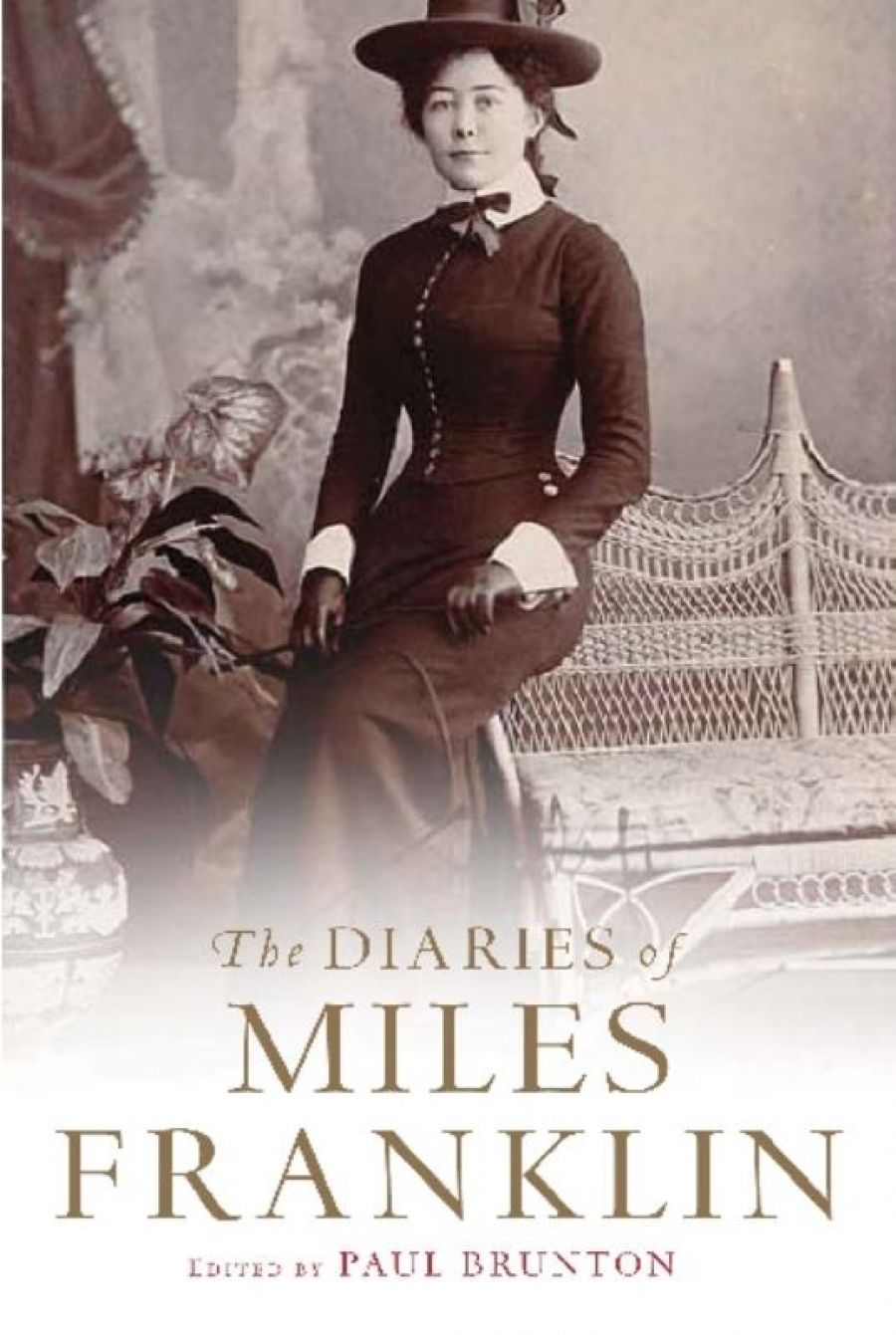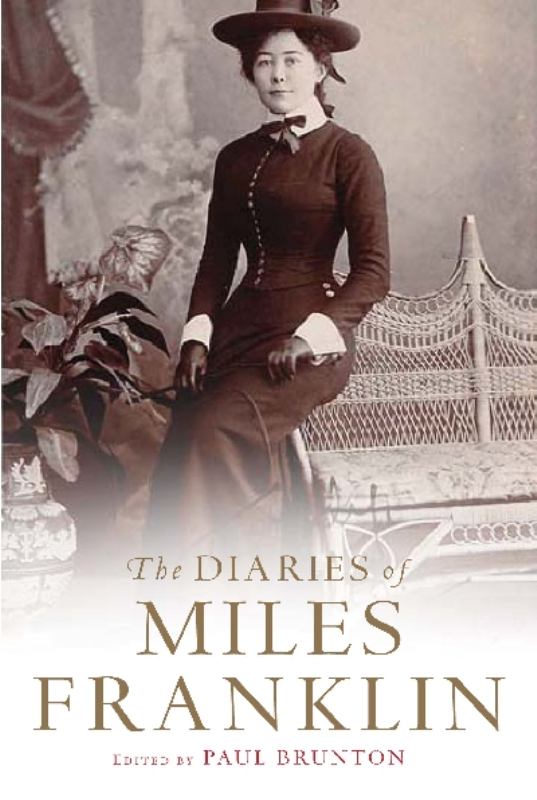
- Free Article: No
- Contents Category: Diaries
- Review Article: Yes
- Article Title: A Life Enhancer
- Online Only: No
- Custom Highlight Text:
The publication of Miles Franklin’s diaries, written during her years in Australia from 1932 until her death in 1954, must be one of the year’s major literary events. events. Franklin, who frequently lamented her relative neglect in the contemporary literary culture of the 1930s and 1940s, has become steadily more and more visible since the 1970s, when international feminism discovered My Brilliant Career (1901). Meanwhile, much of her continuing significance is due secondarily to the extensive biographical research by Jill Roe and others.
Primarily, Paul Brunton’s source is the enormous archive of letters, manuscripts, reviews, notebooks, and diaries that Franklin left to the Mitchell Library. Brunton has mined this archive with great sensitivity and fine scholarship. This volume has a balanced introduction placing the entries in the context of Franklin’s life, explanatory footnotes through the text, a glossary of names, a bibliography of Franklin’s published works, a list of manuscript sources, an index and photographs. An occasional editorial note is inserted tactfully as a biographical signpost.
- Book 1 Title: The Diaries of Miles Franklin
- Book 1 Biblio: Allen & Unwin, $39.95 hb, 304 pp
- Book 1 Cover Small (400 x 600):

- Book 1 Cover (800 x 1200):

Primarily, Paul Brunton’s source is the enormous archive of letters, manuscripts, reviews, notebooks, and diaries that Franklin left to the Mitchell Library. Brunton has mined this archive with great sensitivity and fine scholarship. This volume has a balanced introduction placing the entries in the context of Franklin’s life, explanatory footnotes through the text, a glossary of names, a bibliography of Franklin’s published works, a list of manuscript sources, an index and photographs. An occasional editorial note is inserted tactfully as a biographical signpost.
My only quarrel with the volume is with its cover. The familiar posed photograph of the young Franklin in Edwardian dress gives no indication of the maturity and wit that are in store for the reader. A better choice would have been the photograph inside the book of Franklin in the 1940s wearing one of the floral hats of her own creation.
The entries vary in length and regularity, but they build up steadily to compose a movingly intimate picture of a complex individual. As Brunton comments in his introduction, there is a dramatic contradiction between Franklin’s private and public selves. If many of the entries record her inner unhappiness and frustrations, many also underscore the fact that others saw her as vibrantly witty and original, a ‘life enhancer’ in Brunton’s words. For six years after her return to Australia in 1932, Franklin cared for her ageing mother, and thereafter for her brother and nephew. Much of her energy went into household drudgery, made more difficult by the family’s reduced financial circumstances. Intensely loyal to her relations, Franklin was also emotionally alienated from them, again and again recording her despair at their insensitivity. Her mother has a ‘corrosive power’ that destroys her power to work. Frustrated by her brother’s inability to appreciate her books, she comments that ‘an uncongenial family, if one is affectionate & sticks to them, congeals one in a special hell shut out from friends’. The deaths of her mother and brother brought an even more intense loneliness and sense of guilt. Addressing her dead father directly in one entry, she reflects that his death has made her life like a house without a roof. Later, she contrasts the emotional effect of the deaths of each parent: memories of her father bringing with them a blessing, whereas that of her mother still wound her from ‘beyond the grave’. Loneliness was exacerbated by poverty. Apart from royalties from her books (slim at the best of times), and fees from radio broadcasts, talks and articles, Franklin had an income of only £3 per week from her mother’s estate following the latter’s death in 1938.
All That Swagger, which won the S.H. Prior Award in 1936, was relatively successful financially and attracted good reviews. The event, as recorded in the diaries, casts light on Franklin’s addiction to disguises and her ambivalence about appearing before the reading public. On the one hand, resentful of the attention that other ‘inferior’ writers received, she undertook numerous lengthy ruses to prevent the judges from discerning her authorship when she submitted the novel. Even stranger is her attitude to the novels she wrote as ‘Brent of Bin Bin’. As Brunton comments, she had no scruples about praising Brent’s books publicly, chairing a meeting of the Fellowship of Australian Writers that debated the author’s identity, and lauding the novels in her lectures for the Commonwealth Literary Fund. In her diaries, she continues the practice of treating Brent as a separate individual, frequently comparing the Australianness of contemporary novels with ‘his’. Franklin’s occasional habit of teasing friends who telephoned by disguising her voice has been well documented, but the oddity of maintaining doubleness even when writing to herself suggests that her relationship to her pseudonym was more complicated than it previously seemed.
Her copious diary notes on contemporary books by other writers suggest that Brent may have represented an experiment and a challenge to other writers. Passionate about Australia, Franklin was also dismissive of Anglo-European traits in local writing. The Australian scene in such writers as Henry Handel Richardson and Christina Stead does not ‘well from the bone’, and Brent ‘must finish his series’ before we can see if he remains at the head of those attempting ‘to interpret Australia in her own terms from the inside’. At the same time, she is a devastating critic of her contemporary ‘fictioneers’. Palmer is ‘so careful that his work is lifeless’. An ‘honest self-respecting workman’, he is ‘constantly imbued with the importance of being a man of letters’. M. Barnard Eldershaw have no love for Canberra in Plaque with Laurel (1937). They ‘do not feel it or really know it – they wear it like a stiff new suit that has all its tailor’s creases retained’.
Fascinating as the diaries are in their disclosures of Franklin’s personality and circumstances, they also provide a wonderfully comic record of Sydney’s literary scene. A gifted satirist, Franklin watches the local scene with a gritty absorption, constantly alert for absurdities and pretensions. Dame Enid Lyons, who has ‘fat hams of arms – ribbon order across ponderous bosom, face all gone to fat’, is ‘merely the glib male politician in skirts’. Lady Huntingfield, ‘a great, stiff tall Clydesdale of a woman, plain of feature and plain of hair’, towers ‘like an armoured dinosaur – there is nothing billowy or pillowy in her body’. A man observed in the theatre is described as having a face ‘as callow as a baby seal’. J.I.M. Stewart, condemned for his superior English style, gives a talk that is ‘a good example of the professional policy of spreading a little jam on a wide piece of bread’. H.M. Green is ‘so much smaller than his subject’, and Hartley Grattan has many more grey hairs in his soul than in his head. As for Xavier Herbert, he ‘is egotistical in an overwhelming way, he not only exhausts others but winds himself in his search of himself’. A lengthy description of a meeting to celebrate the fortieth anniversary enactment of women’s suffrage in New South Wales is a piece of high farce. At the same time, Franklin responds to real kindness like a parched plant to water, and frequently acknowledges the value of such people as Beatrice Davis, Frank and Thelma Clune, and Ada Holman.
Meanwhile, the blackest of her bêtes noires, Mary Gilmore, presides over Franklin’s pithiest satires as she presided over the contemporary literary scene. Franklin’s selection for the OBE (which she refused) after Gilmore was made a Dame Commander of the Civil Division of the British Empire was one of the most wounding shafts that Franklin had to bear. It would undoubtedly gratify her to know that Gilmore’s reputation has descended in more than inverse proportion to her own ascent.


Comments powered by CComment